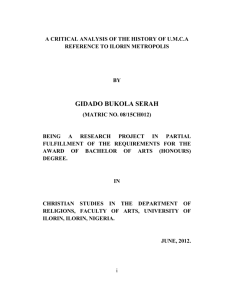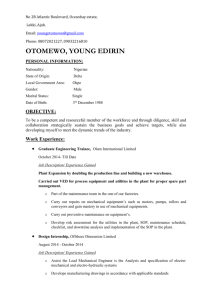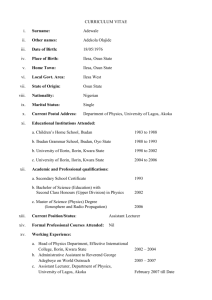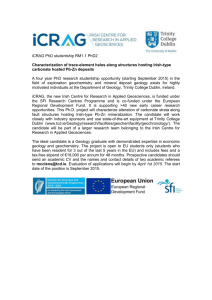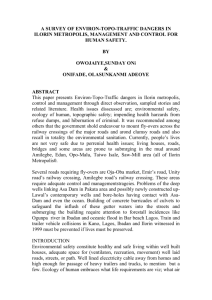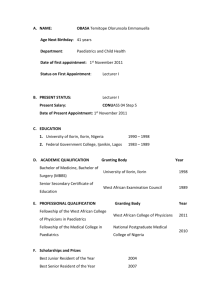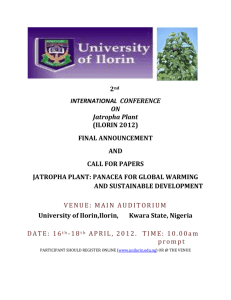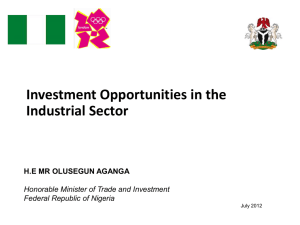Seeing is Believing - University of Ilorin
advertisement
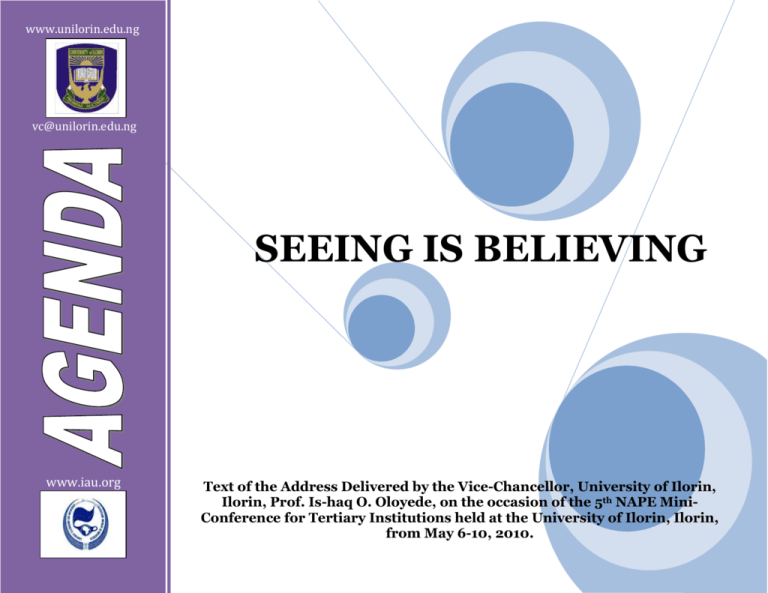
www.unilorin.edu.ng vc@unilorin.edu.ng SEEING IS BELIEVING www.iau.org Text of the Address Delivered by the Vice-Chancellor, University of Ilorin, Ilorin, Prof. Is-haq O. Oloyede, on the occasion of the 5th NAPE MiniConference for Tertiary Institutions held at the University of Ilorin, Ilorin, from May 6-10, 2010. SEEING IS BELIEVING I am highly enamoured to welcome you all, on behalf of the management, Senate, staff and students of the University of Ilorin, to this august occasion. It is our joy to receive you all as part of discharging our triple mandate of teaching/learning, research and community service. With your distinguished presence in our University, you have provided us more opportunities to learn, given us more resources to teach with, availed us more research opportunities and accorded us the chance of serving more youths. As stated in the circular and the invitation letter sent to me, I agree no less that “the NAPE mini-conference is expressly for the benefit of scholars in the academic environment....” I know that not only those interested in Geosciences and environment careers will benefit from it, the representatives of petroleum/mineral industries seeking employees and indeed all of us will also gain tremendously from the conference. Once again, I welcome you all. As it is said that virtue begins when an individual dedicates himself actively to the job of gratitude, let me begin on a virtuous note by appreciating the Nigerian Association of Petroleum Explorationists (NAPE) generally, for its avowed commitment to the development of education as a way of developing the nation, and particularly, for bringing this year’s biennial conference to the University of Ilorin. To say that the Association, especially through its University Assistance Programme (UAP), has been in the forefront of promoting excellence in education is to state the obvious. From what I have seen so far, and seeing is believing, of the various interventions that the Association has taken, I can conveniently assert that NAPE is a Leader in creating opportunities for the young ones. Permit me to congratulate you on taking this first-ever initiative by any professional organisation in the country. To use the slang of the young for whom this conference is meant, let me acknowledge that “we feel you.” Thus, we thank you and we urge other professional associations to emulate you. The theme of “Empowering Geoscientists with Entrepreneurship Skills” chosen for this fifth NAPE mini-conference is significant because we are at a point where entrepreneurship is crucial to the attainment of development. As noted by the Association of Vice-Chancellors of Nigerian Universities (AVCNU) at their 24th conference hosted by the University of Ilorin last year, a giant stride that has been made in the University education in recent years is the “introduction of entrepreneurial 1 programmes in the University curriculum”. At the University of Ilorin, the establishment of the Technical and Entrepreneurship Centre, was aimed at developing such skills in graduates so that they will become job creators, not job seekers. Distinguished ladies and gentlemen, Nigeria is one of the world’s nine most populous developing countries and education remains the only means through which we can attain the much-cherished development. Today, 21.1 million Nigerian children do not have access to primary education and only 10.4 million of the 33.9 million Nigerians eligible for secondary education are actually in school. Of the 234,682 candidates that sat for the last National Examination Council (NECO) examinations, only 4,223 or roughly six per cent made five credits in five subjects including Mathematics and English, which is the minimum requirement for admission into the tertiary education level. Only 2% of the 80 million Nigerian youths are in tertiary institutions. As if this is not bad enough, only 20% of the graduates are said to be employable. It is this last point that I quickly want to address. If the question is asked: why are many graduates unemployable? The answer is poignant: the bane of our education system over the years has been its emphasis on theory rather than practice. However, it is gratifying that this is now being corrected with universities now running entrepreneurship programmes. The danger in theory without practice, reflecting in the current level of development in Nigeria, has been captured by that quintessential 12th Century Professor of Al-Azhar University, Cairo, Imam Al-Gazali, in one of his treatises, Ayyuhal Walad (“O Boy!”). According to him, Be it known very well that knowledge will not save a person unless it is put into practice. Let me clarify this point with an example for you: supposing someone fully armed suddenly met a lion in the mountains, no matter how brave and how good he might be in using a gun and a sword, could he save himself from this lion unless he used his weapon? He could not, as you too know very well. By the same token, however deeply learned a person may be, his knowledge will come to naught if he does not act upon his knowledge. Another example is a doctor who becomes ill himself. Supposing he diagnosed his illness, sheer knowledge would not cure him unless he took the 2 medicine…. However much a person may have learned and however many books he may have read, all this will be an exercise in futility unless he practises what he knows. With entrepreneurship skills, which requires multi skills (basic skills, communication skills, professional skills, leadership skills, emotional intelligence skills, financial management skills, project management skills, time management skills, problem solving skills and interpersonal skills, among others) without the over-specialization of skills, Nigerian youths will be more empowered to think big by starting small instead of always looking for jobs, many of which the youths are not even qualified for as a result of dearth of necessary skills. It is my belief that as geoscientists in training and as students in general, the cultivation of these skills can only make you more competitive and successful as future leaders and entrepreneurs. Given the centrality of Geosciences to the Nigerian economy, the University of Ilorin has been in the forefront of Geosciences education and research since inception in 1975 when its Department of Geology and Mineral Sciences was established. The Department now operates programmes at the B.Sc., M.Sc. and Ph.D levels in all fields of Geo-exploration. Apart from the all-embracing B.Sc. Honours programme in Geology, the Department runs M.Sc degree programmes in Mineral Exploration with options in (i) Solid Mineral Geology (ii) Petroleum Geology and Sedimentology and also M.Sc in Applied Geophysics. Ph.D degrees are equally offered in all fields of Applied Geology. Our undergraduate and postgraduate programmes have the objectives of providing complete academic training with skills to make recipients of our degrees full professionals in the exploration and exploitation of the earth resources. Our training therefore provides opportunities for the cultivation of skills in a wide array of fields including petroleum, solid minerals, water resources and environmental sectors and our graduates have always been rated among the best. Many of them have won competitive scholarships for advanced studies in renowned world universities at various times. We have won grants including the AAPG L. Austin Weeks Grant and AAPG Grant-in-Aid. A 2002 first class graduate of this University, Kayode Samuel, to cite a single example, was exempted from an M.Sc. programme in the University of 3 Newcastle in the U.K. and had successfully completed a Ph.D in Geology in the same University three years ago. The modest achievements of the University have been appreciated with the level of support we receive from both the government and the private sector. Through the PTDF fund, a new Department of Geology and Mineral Science building was constructed and commissioned on October 22, 2009. This building now houses the Department and the University remains grateful to the PTDF for the building and training facilities provided. The assistance we received from participating in the NAPE-UAP scheme through the donations of books, journals, software equipment, etc. have also in no small measure enhanced the training of Geoscientists in the University of Ilorin. Significant efforts to support the University in this field have equally been made by Shell Petroleum Development Company, Chevron/Texaco, Exxon/Mobil Paradigm Geophysical and Western Geco. To them all we express our heart-felt gratitude. Just two months ago, precisely on March 12, 2010, the former Minister of Education commissioned the N130 million geosciences workroom donated to us by Mobil Producing Nigeria Unlimited. I also want to put on record the tremendous encouragement provided to our students, who were availed the opportunity of joining the student chapters of the American Association of Petroleum Geologists (AAPG), the world class Association to which NAPE is an affiliate. Lastly, I strongly believe that this mini-conference will offer an opportunity for students and lecturers to showcase their individual works, demonstrate their technical expertise and project the impact of their research activities and skills, which potential oil and gas employers can key into. In an event like this, we should be able to harness more support and interest from the industry than the smaller departmental seminars and Geosciences week of individual universities. We would welcome feedbacks from you distinguished members of the industry about how you think we are doing. On our part, we promise not to be reluctant in suggesting ways through which you might still help us while remaining grateful for all the past efforts. We have embarked on the establishment of a National Geological-Field-Work Camp to serve geological needs of Geo-Sciences trainers and trainees in Nigeria. The University has recently acquired a strategic location at Share, seventy km north of Ilorin. The choice of Share and environ as field study area is 4 informed by its being one of the few readily accessible locations in Nigeria with outcrops of Precambrian to Lower Paleozoic crystalline basement rocks and facies of Cretaceous alluvial fan, braided stream, flood plain and marginal marine sediments of the rift related Nupe Basin of northcentral Nigeria. It is also an area adjoining the mineralized Egbe-Isanlu schist belt with deposits of precious metals, rare-earth metals, gemstones and industrial minerals. In addition many springs characterize the basement- sedimentary unconformities in the area. When fully operational, the management will be entrusted to all the Departments of Geology in Nigerian Universities. As I welcome you to the University of Ilorin that people now say is a peacock among the birds of the Nigerian university system, I enjoin you all to interact with our staff and students, so that we can learn from you and you too may further learn from us. I share the sentiments of the mercurial Prof. H.H. Read, who of course is well read, that “all things being equal, the best geologist is the one who has seen the most rocks.” Seeing is believing, you the best geologists who have seen it all are here. This is our University. Believe it is better by far. You are welcome. Thank you very much for your attention. 5
